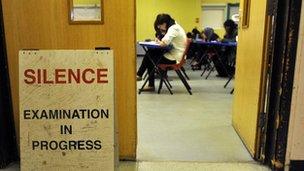Heads challenge Ofqual to publish all GCSE grade research
- Published

Heads say teachers and pupils need to see the full consultancy report as a matter of urgency
Heads affected by the GCSE English grading fiasco have urged England's exam regulator to publish full details of a study it commissioned.
Ofqual paid business consultant Capgemini £150,000 to interview teachers at 100 schools and colleges.
The findings appeared as a 16 page appendix to Ofqual's own report.
In a letter to chief executive Glenys Stacey the heads demand publication of all Capgemini's research, including the interview transcripts.
The open letter is signed by five head teachers and the leader of the National Association of Head Teachers union, Russell Hobby.
It states: "It strikes us as odd that very little of what Capgemini found actually appears in the final Ofqual report."
"We note that also that the Capgemini report has not been published at all and your report relies heavily on comments on the TES [Times Educational Supplement] forum.
"We don't think this is enough of a basis to make the conclusions you have made. Social media should not be used in this way."
The heads ask Ofqual to respond to their request "as a matter of urgency".
A discussion paper produced for Ofqual's board in September said Capgemini's investigation was to be "a significant piece of work involving interviews with teachers/heads from approximately 100 school and colleges including those that have seen large changes, positive and negative as well as those where there has been no change year-on-year".
The paper says the investigation was to help Ofqual "understand why some centres were so surprised by their results".
'Details confidential'
In their letter, the heads ask: "As so little evidence from this expensive consultancy is actually used in the final report we can only assume that it did not say what you expected (or wanted) it to say?"
A spokesman for Ofqual told BBC News: "We have received the letter and our considering our response. The Capgemini report is published in the Ofqual report from two weeks ago. We would encourage people to read that report in full."
The spokesman added that interview transcriptions could not be published as the details were confidential.
One of the letter signatories, Kenny Frederick, head of George Green's school in London, said: "We think this report that Ofqual has commissioned and apparently quietly buried should be made available to teachers, parents and pupils so that they can judge the evidence for themselves.
"Unless we see that evidence we can only conclude Ofqual has based its findings on gossip cut and pasted from an internet chat room."
Ms Frederick told BBC News that she did not understand why the full report should be confidential and that it would easy enough to publish the transcripts without the details of the schools and individuals who gave the interviews.
"The point is there is a lack of trust. Schools are extremely suspicious and really have little confidence in Ofqual's ability to regulate."
In its own report into the controversy, published on 2 November, Ofqual concluded that pressure on schools in England to hit targets led to overgenerous marking of coursework by teachers and that, as a result, external examiners had to raise grade boundaries in the June exams.
Heads have said it was "outrageous" to blame teachers for the fiasco which saw thousands of pupils get lower grades than predicted.
In October an alliance of head teachers and councils launched legal action against Ofqual and two exam boards detailing the case for the exams to be regraded.
In Wales nearly 2,400 pupils had their grades raised for GCSE English after the Welsh government ordered a review.
- Published2 November 2012
- Published26 October 2012
- Published12 October 2012
- Published11 October 2012